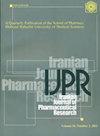剑桥神经心理测试自动化电池(CANTAB)评价利瓦斯汀对轻度认知障碍患者决策的影响随机、双盲、安慰剂对照试验
IF 1.8
4区 医学
Q3 PHARMACOLOGY & PHARMACY
引用次数: 0
摘要
背景:决策是一个复杂的过程,大多数研究表明轻度认知障碍(MCI)患者的决策比健康人更差。目的:采用剑桥神经心理测试自动化电池(CANTAB)测试,评价利瓦斯汀对MCI患者决策的影响。方法:研究在Roozbeh医院神经病学门诊进行,随机招募30例40岁以上轻度认知障碍患者,每天2次接受瑞瓦斯替明或安慰剂治疗,持续12周。利瓦斯汀或安慰剂的初始剂量为1.5 mg,每日两次,并增加至3mg,每日两次。在干预前后分别进行了CANTAB测试。结果:利瓦斯汀组患者平均年龄为58.93±10.88岁,安慰剂组患者平均年龄为59.33±10.34岁。两组的中位MMSE (Mini-Mental State Examination)均为26 (IQR = 25 - 26)。利瓦斯汀组患者在CGT、IST和SST的所有亚组测试中,除了CGT测试的风险调整、IST测试的区分、go试验的中位正确RT和SST测试的中位正确RT外,其他亚组测试均存在显著差异。最常见的不良反应是胃肠道并发症。结论:结果显示,与安慰剂相比,利瓦斯汀可显著改善患者的主要决策结局。本文章由计算机程序翻译,如有差异,请以英文原文为准。
Evaluating the Effects of Rivastigmine on Decision-Making in Patients with Mild Cognitive Impairment by Cambridge Neuropsychological Test Automated Battery (CANTAB); A Randomized, Double-Blind, Placebo-Controlled Trial
Background: Decision-making is a complex process, and most studies showed that patients with mild cognitive impairment (MCI) make worse decisions than healthy people. Objectives: This study aims to evaluate the effect of rivastigmine on the decision-making of MCI patients using the Cambridge Neuropsychological Test Automated Battery (CANTAB) tests. Methods: The study was conducted at the Roozbeh Hospital neurology clinic, and 30 patients with mild cognitive impairment over 40 years old were randomly recruited to receive rivastigmine or placebo twice daily for 12 weeks. The initial dose of rivastigmine or placebo was 1.5 mg twice daily and was increased to 3 mg twice daily per patient compliance. A CANTAB test was conducted before and following the intervention. Results: The mean age of patients in the rivastigmine group was 58.93 ± 10.88, and in the placebo group was 59.33 ± 10.34. The median MMSE (Mini-Mental State Examination) was 26 (IQR = 25 - 26) in both groups. Patients in the rivastigmine group showed significant differences in all subgroup tests of CGT, IST, and SST except in risk adjustment in the CGT test, discrimination in the IST test, and median correct RT on the go trial and SSRT in the SST test. The most commonly reported adverse effects were gastrointestinal complications. Conclusions: According to the results, rivastigmine significantly improved the primary decision-making outcomes in comparison with placebo.
求助全文
通过发布文献求助,成功后即可免费获取论文全文。
去求助
来源期刊
CiteScore
3.40
自引率
6.20%
发文量
52
审稿时长
2 months
期刊介绍:
The Iranian Journal of Pharmaceutical Research (IJPR) is a peer-reviewed multi-disciplinary pharmaceutical publication, scheduled to appear quarterly and serve as a means for scientific information exchange in the international pharmaceutical forum. Specific scientific topics of interest to the journal include, but are not limited to: pharmaceutics, industrial pharmacy, pharmacognosy, toxicology, medicinal chemistry, novel analytical methods for drug characterization, computational and modeling approaches to drug design, bio-medical experience, clinical investigation, rational drug prescribing, pharmacoeconomics, biotechnology, nanotechnology, biopharmaceutics and physical pharmacy.

 求助内容:
求助内容: 应助结果提醒方式:
应助结果提醒方式:


